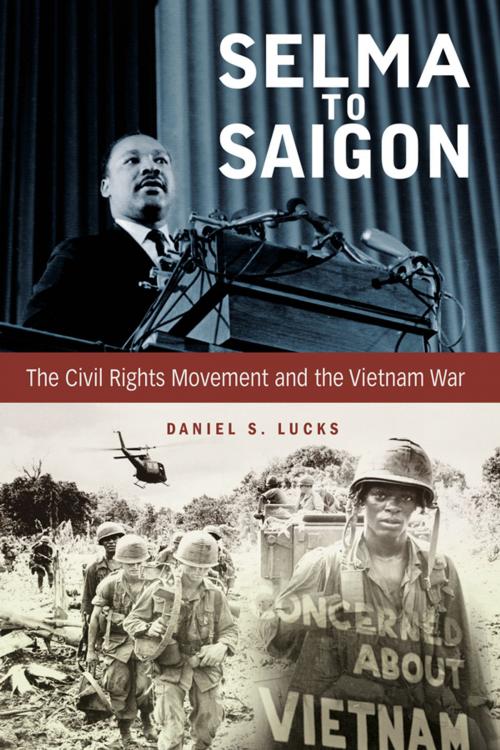Selma to Saigon
The Civil Rights Movement and the Vietnam War
Nonfiction, Social & Cultural Studies, Political Science, Politics, Civil Rights, History, Military, Vietnam War, Social Science, Cultural Studies, African-American Studies| Author: | Daniel S. Lucks | ISBN: | 9780813145082 |
| Publisher: | The University Press of Kentucky | Publication: | March 24, 2014 |
| Imprint: | The University Press of Kentucky | Language: | English |
| Author: | Daniel S. Lucks |
| ISBN: | 9780813145082 |
| Publisher: | The University Press of Kentucky |
| Publication: | March 24, 2014 |
| Imprint: | The University Press of Kentucky |
| Language: | English |
The civil rights and anti--Vietnam War movements were the two greatest protests of twentieth-century America. The dramatic escalation of U.S. involvement in Vietnam in 1965 took precedence over civil rights legislation, which had dominated White House and congressional attention during the first half of the decade. The two issues became intertwined on January 6, 1966, when the Student Nonviolent Coordinating Committee (SNCC) became the first civil rights organization to formally oppose the war, protesting the injustice of drafting African Americans to fight for the freedom of the South Vietnamese people when they were still denied basic freedoms at home.
Selma to Saigon explores the impact of the Vietnam War on the national civil rights movement. Before the war gained widespread attention, the New Left, the SNCC, and the Congress of Racial Equality (CORE) worked together to create a biracial alliance with the potential to make significant political and social gains in Washington. Contention over the war, however, exacerbated preexisting generational and ideological tensions that undermined the coalition, and Lucks analyzes the causes and consequences of this disintegration.
This powerful narrative illuminates the effects of the Vietnam War on the lives of leaders such as Whitney Young Jr., Stokely Carmichael, Roy Wilkins, Bayard Rustin, and Martin Luther King Jr., as well as other activists who faced the threat of the military draft along with race-related discrimination and violence. Providing new insights into the evolution of the civil rights movement, this book fills a significant gap in the literature about one of the most tumultuous periods in American history.
The civil rights and anti--Vietnam War movements were the two greatest protests of twentieth-century America. The dramatic escalation of U.S. involvement in Vietnam in 1965 took precedence over civil rights legislation, which had dominated White House and congressional attention during the first half of the decade. The two issues became intertwined on January 6, 1966, when the Student Nonviolent Coordinating Committee (SNCC) became the first civil rights organization to formally oppose the war, protesting the injustice of drafting African Americans to fight for the freedom of the South Vietnamese people when they were still denied basic freedoms at home.
Selma to Saigon explores the impact of the Vietnam War on the national civil rights movement. Before the war gained widespread attention, the New Left, the SNCC, and the Congress of Racial Equality (CORE) worked together to create a biracial alliance with the potential to make significant political and social gains in Washington. Contention over the war, however, exacerbated preexisting generational and ideological tensions that undermined the coalition, and Lucks analyzes the causes and consequences of this disintegration.
This powerful narrative illuminates the effects of the Vietnam War on the lives of leaders such as Whitney Young Jr., Stokely Carmichael, Roy Wilkins, Bayard Rustin, and Martin Luther King Jr., as well as other activists who faced the threat of the military draft along with race-related discrimination and violence. Providing new insights into the evolution of the civil rights movement, this book fills a significant gap in the literature about one of the most tumultuous periods in American history.















